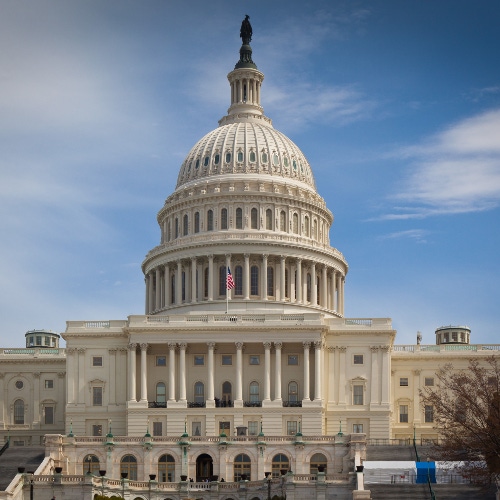AT&T, Verizon urge feds to tax Big Tech
Verizon and AT&T today push money into the Universal Service Fund via a mechanism that many argue isn't sustainable. Their solution? Get big technology companies like Amazon and Google to also start paying into the fund.

Two of the nation's largest telecom providers are now urging federal regulators and lawmakers to levy fees against "Big Tech" companies in order to finance bridges across the digital divide in the US.
However, the new efforts by AT&T and Verizon are running up against opposition from a range of players, including a trade association composed of both network operators and big Internet companies like Google and Twitter.
Broadly, the developments reflect growing momentum globally around the notion of getting big technology companies like Netflix, Apple and Amazon to help pay for the networks that their services run on top of. However, the topic is fraught with complexities, and it's unlikely that any major changes will happen quickly, given political gridlock in the US and elsewhere.
Making Internet service universal
In new filings to the FCC, both AT&T and Verizon argue that money from the "broader Internet economy" is needed to help prop up the Universal Service Fund (USF). The FCC instituted the USF in 1997 to help fund the construction of broadband networks in rural and unserved areas of the country and to help low-income Americans afford telecom services. But the primary sources of funding for the USF are network operators themselves, and current projections show that the funding mechanism for the USF won't last much longer.
In its filing, Verizon argued that it's time to "expand the [USF] contributions base to the broader Internet economy." AT&T too urged regulators to "expand the universal service contributor base to include the most significant enterprises operating within the broader Internet economy."
The companies didn't provide detailed specifics on how exactly those fees should be levied, but AT&T argued "such an expansion should be carefully tailored – assessable products and services can be narrowed to revenues of US-provided Internet-dependent services, and the service providers required to contribute can be limited to the biggest winners in the marketplace."
Neither AT&T nor Verizon mentioned any specific big technology companies.
The companies appeared to disagree about whether the FCC has the authority to make such changes. Verizon suggested that the agency "has the authority to expand the universal service contributor base to include the most significant enterprises operating within the broader Internet economy." But AT&T wrote that Congress should update legislation "to expand the commission's express authority to assess a broader base of companies operating in the Internet ecosystem."
Figure 1:  The United States Capitol at the end of the National Mall in Washington, DC.
The United States Capitol at the end of the National Mall in Washington, DC.
(Source: Inge Johnsson/Alamy Stock Photo)
FCC Chairwoman Jessica Rosenworcel has described the idea as "intriguing," but she has suggested Congress would have to weigh in on the issue before the FCC can act.
Pushing back
Of course, some of the organizations representing big technology companies aren't on board with the idea of expanding the USF contribution base beyond network operators.
"Choosing certain online services to contribute [to the USF] and not others risks skewing the online marketplace and harming competition," wrote Incompass, a trade association representing "Internet, streaming, communications and technology companies both large and small." Incompass members range from network operators like Zayo and C Spire to Internet companies like Netflix, Microsoft and Google.
Incompass continued: "Moreover, it ignores the dynamic nature of the Internet where some services and business models that are popular today may not be tomorrow."
Instead, Incompass argued that the USF needs to be updated so that fees can be levied across network operators' broadband Internet access service (BIAS) revenues instead of just voice calling revenues, as is currently the case.
"Assessing BIAS revenues would lower the USF contribution factor to less than 4% and if the commission fails to act, the factor could reach 40% in the foreseeable future," according to Incompass.
Hovering over the USF debate are billions of dollars in federal funding designed to help poor Americans pay for telecom services, and for network operators to expand into rural and unserved areas. However, much of that stimulus funding will eventually run out – and, according to one report, the funding also isn't comprehensive or organized.
Developments domestically and globally
The FCC isn't the only venue hosting such debates. As noted by Axios, the Senate Commerce Committee is considering bipartisan legislation that would require the FCC to study the feasibility of collecting fees from companies like Google and Netflix to bolster the USF.
Further, Americans aren't the only ones considering such changes. A wide range of Europeans are looking to "alter the regulatory framework underpinning the free and open Internet."
Not surprisingly, European telecom operators too argue that an expansion of Internet services "can only be sustainable if such big tech platforms contribute fairly to network costs."
Similar arguments are being made in South Korea, according to Reuters.
Related posts:
— Mike Dano, Editorial Director, 5G & Mobile Strategies, Light Reading | @mikeddano
About the Author(s)
You May Also Like












